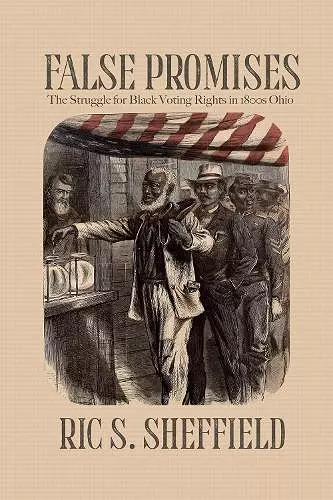False Promises
The Struggle for Black Voting Rights in 1800s Ohio
Format:Paperback
Publisher:Ohio University Press
Published:30th Sep '25
Should be back in stock very soon

Brings to life the struggle for Black suffrage in nineteenth-century Ohio
In False Promises, the fight for Black voting rights in Ohio comes alive through narratives of men of color who defied the state’s nineteenth-century restrictions on suffrage. Though ratification of the Fifteenth Amendment ostensibly extended the franchise, state election laws still forced men of color into a perilous struggle for full citizenship. Ric S. Sheffield depicts their courage and determination, revealing their humanity through stories of sacrifice, resistance, and hope.
Drawing on Saidiya Hartman’s concept of critical fabulation, Sheffield weaves together historical records with imaginative reconstructions of dialogue, setting, and descriptive elements beyond the dusty courthouse pages. Grounded in archival evidence yet reimagined to fill in the silences, these stories recount the lived experiences of those who risked everything to exercise their right to vote.
False Promises also connects these historical battles to the present, illustrating how voter-suppression tactics in today’s Ohio have roots in the racial exclusions of the nineteenth century. By exposing the enduring legacy of white supremacist policies, the book challenges the widespread misconception that racial disenfranchisement was solely a southern problem. Ohio’s complex racial history-noted for its role in the Underground Railroad but also for its repressive Black Laws-also includes a fierce and ongoing struggle over the right to vote. Through compelling storytelling, historical analysis, and a reclamation of voices lost to history, False Promises urges readers to reconsider their understanding of democracy and the right to vote.
"Ohio is understood as a free state, but this book reveals that voter suppression is nothing new. Through extensive research and engaging portraits, Ric S. Sheffield introduces us to Black men who defended their rights with courage, faith, collaboration, and tenacity. This book provides us with an Ohio history that is more honest and more human. It’s an inspiring and edifying read." - Rachel Jamison Webster, author of Benjamin Banneker and Us: Eleven Generations of an American Family
"Law is often viewed as separate from the daily lives of human beings but law and humanity are intricately intertwined. Law is understood best when presented within the context of narratives about the lives of those impacted. Storytelling focuses upon the human experience as opposed to conventional law texts, which tend to convey detachment and an indifference to the impact of legal structures and institutional processes. False Promises expertly brings to life the struggle for voting rights in Reconstruction era Ohio told through the stories of those who lived it. False Promises enables us to know and care about the forgotten heroes who refused to be denied their humanity and their right to vote. It also reminds us that history is now." - Naomi Raquel Enright, author of Strength of Soul
"False Promises reminds us that the power of law resides in its capacity to bring about justice. It seeks to confront a lengthy history of American injustice through its stories about how the concept of democracy rang hollow in the face of resistance to the Black vote in Reconstruction-era Ohio." - Francis V. Gourrier, Kenyon College
"More than 150 years after the passage of the fifteenth amendment to the U.S. Constitution, racialized struggles around voting rights are ongoing. Ric S. Sheffield’s book details Reconstruction-era struggles for Black equality in the rural Midwest, making visible a previously overlooked aspect of Civil Rights history and enriching our understanding of the rich variations in Black experience across the country. Sheffield skillfully weaves the available fragments of fact and adds “flesh” to those historical bones, bringing the stories of individuals to life, and thereby drawing readers into deeper engagement with ongoing struggles for racial justice. In addition to its contributions to Civil Rights history, legal studies, and midwestern history, this book makes important contributions to the study of mixed race. Scholars frequently discuss the litigation around mixed race in relation to marriage or segregation, but as Sheffield shows through his analysis of the application of the “visible admixture” standard, racial definition and classification were also key in the context of voting." - Jené Schoenfeld, Kenyon College
ISBN: 9780804012577
Dimensions: unknown
Weight: unknown
192 pages